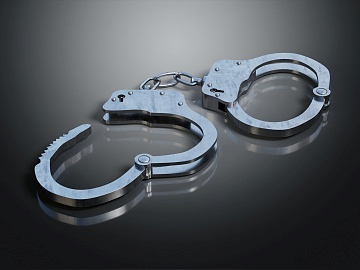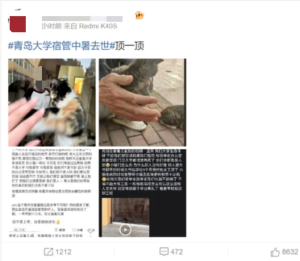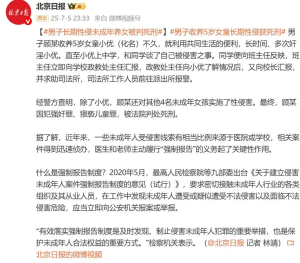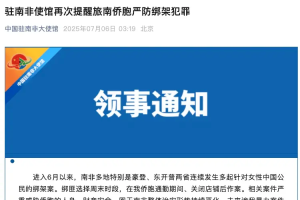China: 14-year-olds are breaking the law, will they be detained?

Source: China News Weekly
“For those aged 14 to 16 and 16 to 18 who violate public security management for the first time but the circumstances are serious and the impact is bad, or those aged 14 to 16 who violate public security management more than twice within one year, detention shall be implemented according to law.”
On June 27, the 16th meeting of the Standing Committee of the 14th National People’s Congress voted to pass the newly revised Public Security Administration Punishment Law, which will come into effect on January 1, 2026.
The previously announced third draft of the revised bill proposed to lower the age of detention for minors in certain circumstances to 14 years old, which aroused public attention.
The Public Security Administration Punishment Law has always been known as the “small criminal law”. More than half of the behaviors in the bill are the same as those in the criminal law, but the circumstances are different. The law was officially implemented in 2006, and this is the first major revision.
After the criminal law has lowered the minimum age of criminal responsibility, the new provisions of the third draft of the “Public Security Administration Punishment Law” also responded to the issues that have received high attention in the field of juvenile delinquency in recent years. How to understand these changes? What are the considerations in the revision process? On these issues, China Newsweek interviewed Yuan Ningning, deputy director of the Minors Affairs Governance and Law Research Base of China University of Political Science and Law.
China Newsweek: The revised provisions of the Public Security Administration Punishment Law lower the age of minors who can be detained in certain circumstances to 14 years old. Previously, the lower age limit was 16 years old. How do you view the considerations behind this adjustment? Why should the age of punishment for minors be lowered?
Yuan Ningning: Generally speaking, before minors commit crimes, there is an evolution process from public security violations to crimes.
In practice, there are indeed a few young minors who have committed violent bullying, malicious harassment, multiple thefts and other behaviors of a very bad nature, and the consequences and social impacts are extremely bad. Some minors know that their age does not meet the standard for administrative detention, so they repeatedly commit crimes, which endangers social security and is not conducive to the physical and mental growth of minors. The previous practice of not detaining minors under the age of 16 was considered to be insufficient in terms of punishment deterrence when dealing with such extreme cases.
In this case, while legislators are trying to protect the majority of minors who commit minor offenses and “give a hand and save them”, they are also trying to send a clear signal to the very few minors who refuse to change their ways or commit serious harmful acts and their guardians: the law is not powerless.
However, it should be noted that the draft does not generally lower the age of punishment, but sets strict thresholds for detaining minors, such as “serious circumstances, bad influence” and “more than twice within a year”. The purpose is to limit detention measures to a few extreme cases and provide a legal basis for dealing with the phenomenon of “breaking the bottom line” in practice.
China News Weekly: Some people think that it is not necessary to lower the age of punishment for violations, because administrative detention may not have a great effect on correcting minors’ illegal behaviors, and at the same time, detention places are not conducive to their physical and mental health. What do you think?
Yuan Ningning: Among the types of penalties stipulated in the Public Security Administration Punishment Law, administrative detention is the only penalty that deprives people of their personal freedom, and its severity is second only to control, detention and fixed-term imprisonment in criminal penalties.
In the short term, detention can indeed control minors who commit serious violations and have a deterrent effect on them. However, detention may indeed cause psychological trauma to minors: their studies will be interrupted during detention; the detention center environment is complex and may cause “cross infection”; the experience of being detained may also bring stigmatized identity labels to minors. If they are detained repeatedly, some minors may feel that it doesn’t matter, anyway, they can be released in 15 days at most, which will strengthen their anti-social cognition and increase the risk of breaking the law again.
In other words, from the perspective of curbing juvenile delinquency, the effect of detention may not be as good as expected. Legislators also realize that they cannot “just lock up and leave it alone”, so the draft connects the correctional education measures for minors and adds a new provision: “For minors who are not given public security punishment or detention due to insufficient age, the public security organs shall take corresponding correctional education and other measures in accordance with the provisions of the Law on the Prevention of Juvenile Delinquency.”
The draft adds this provision to ensure that minors who break the law, regardless of their age, must be dealt with in accordance with the law, and overall connect with my country’s juvenile delinquency prevention and governance work.
China News Weekly: How is the current development of correctional education for minors in my country?
Yuan Ningning: The Law on the Prevention of Juvenile Delinquency, revised in 2020, stipulates a series of correctional measures, including correctional education, special education, and special correctional education, to ensure that serious bad behaviors of minors are managed, controlled, and well managed. At present, relevant national departments have issued documents to refine the application of special education and special correctional education, and further improve the top-level design. The number of special schools in many places is insufficient. In the past two years, various provinces have also been promoting the construction of special schools and special education.
While making progress, certain problems have also been exposed. For example, the teaching staff and special courses of special schools need to be improved in professionalism; the assessment process and standards for admission to special education need to be further unified; correctional education measures such as ordering to provide social welfare services and ordering to accept social supervision need to be further refined in terms of application and implementation standards; the application procedures of correctional measures need to be standardized and handled in a case-based manner.
In addition, the effective implementation of these measures requires specialized personnel, the exploration and construction of professional juvenile policing, and the participation and support of social workers. For example, the Luqiao District Public Security Bureau of Taizhou City, Zhejiang Province, took the lead in establishing a juvenile police team with an independent organization nationwide and established a sound step-by-step correction and assistance system. Wuxing District, Huzhou City, Zhejiang Province, set up a seedling protection center to educate, supervise and discipline minors who need psychological counseling, behavioral correction and social supervision. These practices need to be summarized and refined, and effective experiences should be promoted nationwide.
For the first time, “draw the sword” against student bullying
“China News Weekly”: The third draft of the revision of the Public Security Administration Punishment Law also regulates campus bullying: “If students are bullied, such as beating, insulting, and intimidating, the public security organs shall impose public security administration penalties and take corresponding correction education measures in accordance with the law.” Why was such a revision made?
Yuan Ningning: Clearly including student bullying in the scope of public security administration penalties can make up for the previous management and punishment limitations of student bullying in the field of public security administration.
From previous cases, a large number of student bullying behaviors, such as minor beatings, long-term insults, online insults, and mild intimidation, cannot constitute intentional injury or provoking disturbances, but they are far beyond ordinary student friction and fall within the scope of regulation of the Public Security Administration Punishment Law. However, the Public Security Administration Punishment Law lacks corresponding provisions. Only when student bullying causes substantial physical harm can the public security organs punish the perpetrators in accordance with the provisions of the Public Security Administration Punishment Law such as “intentional injury to the body of others”, which leads to the ineffective punishment of student bullying.
This revision of the Public Security Administration Punishment Law clearly defines student bullying as an illegal act, and sends a strong signal to perpetrators, potential perpetrators, bystanders, schools, and parents: student bullying is not a minor matter, but a legal bottom line that cannot be touched. In addition, the public security organs have clearer legal authorization and responsibility directions for intervening, investigating, and punishing such student bullying behaviors, which improves governance efficiency.
China Newsweek: The draft stipulates that “if the school fails to report or deal with serious student bullying in accordance with the regulations, it shall be ordered to correct it and recommend that the relevant departments impose penalties on the responsible persons in accordance with the law.” Why is it necessary to emphasize the school’s responsibility in this regard?
Yuan Ningning: Schools play a core role in preventing and controlling student bullying, and it is crucial to emphasize their legal responsibilities. Teachers and administrators have the longest contact with students and are closest to them, so they should be the first-line discoverers and responders of student bullying.
However, in reality, some schools have a tendency to conceal, downplay or even cover up the problem because of the difficulty in handling student bullying incidents and the fear of affecting their reputation or assessment, resulting in long-term and escalating bullying. This draft is linked to the provisions of Article 39 of the Law on the Protection of Minors. For serious bullying behaviors, schools shall not conceal them, but shall report them to the public security organs and education administrative departments in a timely manner, and cooperate with relevant departments to deal with them in accordance with the law. Those responsible for not reporting or dealing with them shall be punished. This is a powerful reverse pressure mechanism to urge schools to face up to the problem.
Timely and accurate reports from schools are the basis for the intervention of public security organs, education authorities, and psychological service agencies. Without first-hand information and early action from schools, these institutions will also be late in intervening, which will reduce the effectiveness of intervention. This revision clarifies that schools will directly bear legal responsibility for negligence in their duties, and emphasizes that schools are not only educators, but also responsible for protecting students from harm by their peers and maintaining public safety on campus.





